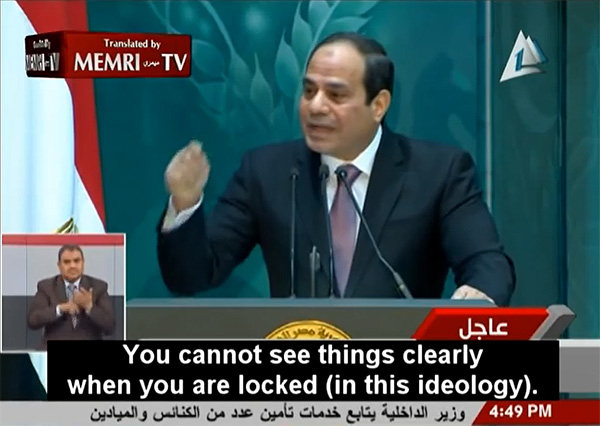![]()
Tuesday, February 23, 2016 | by Michael Armanious
Originally published by Gatestone Institute. Republished with permission.

Egypt’s President, Abdel Fattah el-Sisi, delivered a historic speech to top Islamic scholars and clergy at Al-Azhar University in Cairo, December 28, 2014. (Image source: MEMRI)
At breakfast recently in Alexandria, Egypt, I struck up a conversation with my waiter, Sherif. He was 25-years-old; about the same age I was when I left Egypt. He had recently graduated from a tourism and hospitality school, just completed his military service and his whole life was in front of him. He said his dream was to become a chef so he could save enough money to marry and start a family. He was willing to work hard for a good life.
Today, the restaurant where Sherif works pays him around 500 Egyptian pounds (less than $64) a month. He spends most of his wages on bus fare commuting back and forth to work from one of the poorest sections of Alexandria. Tips keep him slightly ahead, but during slow times Sherif is forced to borrow money to cover his bus fare.
To make matters worse, the neighborhood in which he lives is a stronghold of the Salafists (also known as Wahhabis), an ultra-conservative Sunni Islam religious movement.
The tsunami of radicalization and the Islamization of Egypt began a few years before I left Egypt in 1979. By the early 1970s, Wahhabism had reached the country, brought there by Egyptians who had been living and working in Saudi Arabia and Persian Gulf states.
The day Sherif served me breakfast, I was one of two customers in the restaurant. In the weeks after my visit to Alexandria, a number of attacks against tourists took place. If attacks against foreigners continue, there will be no customers left to serve and Sherif’s hopes for any future will dry up completely.
For men in the same place in life as Sherif, radicalism might seem the only alternative.
Sherif’s story resembles that of the people described by U.S. Senator Lindsay Graham on CNN on December 8, 2015, when he said, “Young people in the Middle East are less sectarian” than the radicals who currently dominate the news. The way to defeat radical jihadists is to invest in young people and families so they can choose a “hopeful life over a glorious death.” People like Sherif and his friends are the people we should be investing in.
Radical imams in Egypt have a head start. For years, they have been flooding their mosques, the airwaves and the internet with messages that make it virtually impossible for young people who internalize them to function in a modern world. Some of these imams regularly travel to the West to promote their ideology, ensuring that the problems Sherif faces in Alexandria will spread to the West.
Given what the perpetrators of violence have been encouraged to believe by leading radical voices in the Muslim community, attacks that are carried out in the name of Islam should not come as a surprise.
In 2014, Professor Saud Saleh, of Al-Azhar University in Cairo, asserted that Muslim men have the right to rape non-Muslim women during times of war. Slavery always existed, she said, but when Islam appeared, it put the institution in order “by limiting it to legitimate wars between Muslims and their enemies.” Under these conditions, Saleh explained, it is appropriate to rape non-Muslim women. “In order to humiliate them,” she said, “they become the property of the army commander, or of a Muslim, and he can have sex with them just like he has sex with his wives.”
Egyptian men not only encouraged to pursue their sexual desires by raping non-Muslims as an act of war, they are exhorted to plunder the coffers of non-Muslims, too. In the early 1990s, Abu Ishaq Alheweny encouraged his followers to solve their financial difficulties by engaging in a jihad [holy war] against the West. Jihad, he argued, was a good antidote to the poverty experienced by Muslims in their countries at home:
“That we are in poverty — is it not due to our abandonment of jihad? But if we could conduct one, two, or three jihadist operations every year, many people would become Muslims throughout the world.”
Alheweny added that whoever “stood in our way, we would fight against him and take him prisoner, and confiscate his wealth, his children, and his women — all of this means money. Every mujahid [jihadist] who returned from jihad, his pockets would be full.”
Crippling notions of jihad are also supported by Salafists in Egypt who promote the sermons of Muhammad Al-Arifi, an imam from Saudi Arabia who broadcasts in both the Middle East and Europe. “Muslims have no life without jihad,” he told young men in a 2013 speech in Cairo. “We will only overcome humiliation with jihad. May Allah support the mujahideen in Syria!”
Another member of the Muslim Brotherhood is Wagdi Ghoneim, an Egyptian Salafist preacher who has lauded the founder of the Muslim Brotherhood, Hassan Al-Banna, for having created a culture of death. Ghoneim, who preached in a number of countries including the U.S. and England, has an active presence on Facebook and Twitter, and has praised Palestinians as masters of “the production of the art of death.”
Imams are able successfully to broadcast hate into Egypt for two reasons. First, more than 17 million of the country’s 90 million inhabitants live in poverty. Egypt suffers from an unemployment rate approaching 30 percent. This gives the imams a ready-made audience. Second, despite the country’s poverty, a huge number of young Egyptians have the technological tools, such as internet access, smartphones and the know-how easily to access messages of hate offered by the imams.
Egypt’s President Abdel Fattah el-Sisi confronted scholars at Al Azhar University in Cairo just over a year ago, telling them in a landmark speech that it is time to tackle radical ideology that has put Muslims at war with the rest of the world. “We need to revolutionize our religion,” he said.
Despite how badly el-Sisi wants to revolutionize the practice of Islam and the country he governs, the government simply lacks the resources necessary to overhaul the country’s educational system to counter the message of hate preached by radical imams.
There is, however, hope. The same electronic devices that imams have used to broadcast hate can also be used to counter jihadism among Egyptian youths. Better yet, today’s technology can teach the next generation the skills they need to participate in a global workforce. Online access to education can allow young Egyptians to grow their knowledge and, in turn, plug into the global economy.
The Library of Alexandria was founded exactly with this purpose in mind. Opening in 2002, this educational institution has more than a dozen “Embassies of Knowledge” throughout Egypt. Their goal is to widen access to educational resources for Egyptians both in person and online.
The library itself is an architectural marvel, but getting to it is not easy. The structure is surrounded by a wall to protect it from attacks by radical Salafists, who say the library represents a threat to their authority. Visitors must pass through a checkpoint to be searched for weapons and explosives before gaining entrance.
If we are serious about reaching out to young people in Egypt, supporting educational institutions like the Library of Alexandria is the surest way to help young men like Sherif to achieve their dreams in their home country, and to turn the next generation away from radical Islam.
Michael Armanious, a U.S.-based news analyst, was born and raised in Egypt.



 RSS
RSS










Latest Comments
Hello Mike, Thank you for your positive feedback to the article. I felt there wasn’t too much critical analysis of ...
Thanks for this considered and well constructed article. A follow up article on the manner in which the editorial contro...
THE CLUELESSNESS OF CLAIMING THAT OBAMA'S MIDDLE EAST POLICIES WERE A FAILURE CANNOT BE FURTHER FROM THE TRUTH, WHAT THE...
As long as Obama is the president of the usa do not trust the us government......
Thank you for an good read....